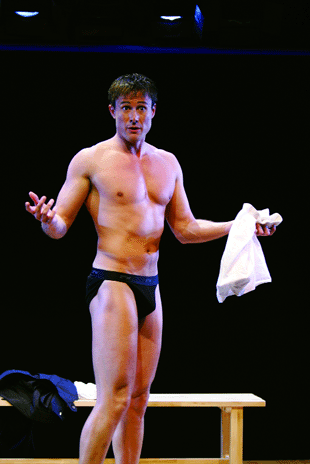A gay ex-Mormon seeks his truth and nearly finds it
During the past few years, Steven Fales toured the country with his unassuming one-boy show, “Confessions of a Mormon Boy,” playing to packed, enthusiastic houses. But one question bedeviled him wherever he went, “Is the story fact or fiction?”
Now that the earnestly engaging tragicomedy is finally making its Off-Broadway debut, the perky playwright/actor hoped to quell any curiosity by adding the tagline “a true story” to the play’s title. But still, for some, the courageous coming-out tale may seem beyond belief.
For starters, Fales’ ordeal as a devout, sixth-generation Utah Mormon who falls from grace and fails to land on his feet, while not altogether unfamiliar, is extraordinary. Denying his same-sex leanings, “Brother Fales” takes a wife and begets two children, fulfilling the destiny of all Latter Day Saints who hope to one day achieve eternal bliss. But after bringing his family East and sneaking a taste of the gay life, not to mention several bouts with reparative therapy, the “gender-disoriented” Mormon Boy comes clean and is booted from the Church forever.
So Fales does what any respectable homosexual disenfranchised from Middle America would do—move to New York City, snag a sublet in Hell’s Kitchen, pursue acting, and woo hook-ups at the Roxy. To pay for rent, child support, college loans, and head shots—he earned a masters degree in acting with dreams of becoming the next Donny Osmond (or Marie)—he joins an escort service and begins “selling his smile” for $500 a pop. He rationalizes escorting as a “gay internship.”
But once he gets hooked on ecstasy and crystal meth, the self-proclaimed oxy-Mormon crashes hard, turning to his once-spurned loved ones for strength. Powerful stuff, to be sure.
Did all this really go down as Fales portrays? Given the recent brouhaha over the veracity of best-selling memoirs, it’s only fair to ask this same question about a bio-play. Fales insists his “non-traditional family history” is factual. He even includes a program note that says so, albeit with a disclaimer that, “Some artistic license has been taken in portraying certain characters and to preserve anonymity of others…”
I have no reason to doubt him—the miracle of his liberation from such turmoil, coming to terms with his true nature, is at the heart of the play.
Equally impressive is the physicality of Fales himself. With corn-fed good looks, Mormon ultra-brite smile, and chiseled Chelsea physique, he seems made-to-order from Central Casting. This presence is particularly handy during the steamy New York portion of the play, where the actor swaps his sacred temple priesthood undergarments for a skimpy pair of black 2(x)ist undies.
Also awe-worthy are the actual recordings of Fales as a child, singing a ditty he invented or a Mormon hymn, which punch up the poignancy at key moments.
Fales must be commended for revealing such achingly personal intimacies. And for packing such a vast amount of convoluted plot into a cohesive, mere 90 minutes. Slipping between a host of other characters—therapists, lovers, pimps, johns—the 30-something actor works up quite a sweat, a nice touch for the druggy scenes of debauchery.
The writing is often sharp and wryly insightful. He describes the Church, which, surprisingly enough, boasts a flock of 12 million, as a “socio-economic-political-tax-exempt-multinational-corporation posing as the Kingdom of God on Earth.” During a crystal-fueled sexcapade, he wanders out on a balcony and muses—“And there was the Empire State Building standing erect in the pink, cool summer morning light. And I wanted to sit on it. And never get off.”
Fales peppers his performance with snippets of vocals and zippy dance moves, which prove he’s more than just a pretty face.
The set, designed by Tim Saternow, is a pleasing minimalist space marked by a handsome wood floor, a bench, and a volume of The Book of Mormon. It provides the ideal backdrop allowing Fales to shine.
Strange as it may seem, Fales’ performance, though admirable, only resonates for intermittent stretches throughout the evening. As directed by Jack Hofsiss, who received the Tony award for “The Elephant Man,” the actor vamps and mugs his way through the narrative, playing it over the top. This hyper-exuberant artifice works in the lighter moments, such as when he mocks the absurdities of the Church, but it undercuts the darker passages.
It’s not until the play’s end, when he literally steps off the stage and sheds his Mormon Boy persona, that we fully connect with this tortured soul.
This self-consciousness, by the way, contrasts with a performance at the 2004 New York Fringe Festival, where “Confessions of a Mormon Boy” won the highly competitive Overall Excellence Award. There, Fales played in a makeshift theater space, conveying a heart-wrenching, nuanced honesty that the current production rarely captures.
Perhaps if this eager-to-please talent imagined himself on a tiny Fringe stage instead of playing Off-Broadway, this production would achieve the authenticity the beleaguered Mormon Boy has been seeking his entire life.
gaycitynews.com



































